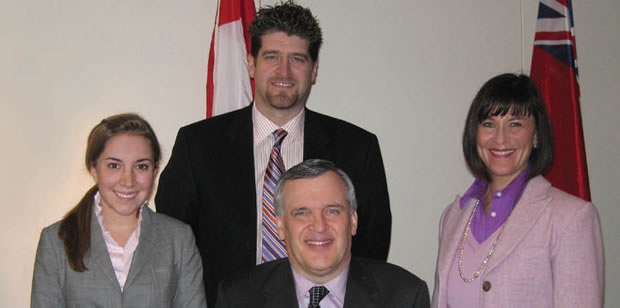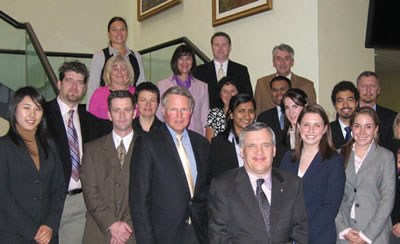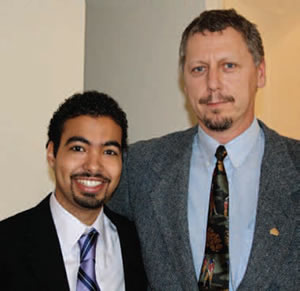Do The Right Thing

Since the age of four, Troy Beharry has been a soccer player. The third-year Commerce student learned his playmaking skills with the North York Hearts Azzurri Soccer Club. Last year, his love of the sport and his education goals merged when he landed a dream summer job.
Hired to work with the Hearts-Azzurri, Troy was handed a mission to do nothing less than put the 1,700-player club – comprised of more than a hundred teams in separate house, indoor and advanced leagues – on a firm footing for the future. He knew these two things going in: the Club needed a sponsorship policy that would help to attract financial backing, and it needed access to government decision-makers who could address the club’s urgent need for a new indoor facility for Toronto’s ever-growing soccer community.
For a volunteer-run, nonprofit organization, tackling such multifaceted challenges can be difficult, if not impossible. Despite their passion for the cause and good intentions, club organizers often lack the time and specialized expertise necessary to deal with complex projects.
“We Are Witnessing A Change In The Landscape Of Corporate Giving”
 Student Melissa Ha and Molson mentor Craig Balfour Fortunately for the Azzurri club, help was on the way. Troy was chosen last summer to take part in the inaugural year of the National Mentoring Program that funded his summer job at Azzurri. This program provides a meaningful mentoring experience for students while building awareness of the principles of corporate social responsibility (CSR). Launched jointly by the School’s Centre for Corporate Social Responsibility and Molson Canada, the National Mentoring Program (NMP) connects seven QSB students enrolled in the Certificate in CSR program with a charity that they feel passionate about and would like to work for during the summer. Molson covers the students’ wages – $7,000 each for 16 weeks – and pairs them with an expert mentor in marketing, strategic planning, or corporate philanthropy from Molson. This mentor advises them in weekly meetings as they work on a specific task for their charity.
Student Melissa Ha and Molson mentor Craig Balfour Fortunately for the Azzurri club, help was on the way. Troy was chosen last summer to take part in the inaugural year of the National Mentoring Program that funded his summer job at Azzurri. This program provides a meaningful mentoring experience for students while building awareness of the principles of corporate social responsibility (CSR). Launched jointly by the School’s Centre for Corporate Social Responsibility and Molson Canada, the National Mentoring Program (NMP) connects seven QSB students enrolled in the Certificate in CSR program with a charity that they feel passionate about and would like to work for during the summer. Molson covers the students’ wages – $7,000 each for 16 weeks – and pairs them with an expert mentor in marketing, strategic planning, or corporate philanthropy from Molson. This mentor advises them in weekly meetings as they work on a specific task for their charity.
Though it’s only a year old, the NMP is proving to be one of the more successful ventures of the Centre, whose mandate is to instill awareness amongst Commerce students, corporate clients, and the public that while businesses need to turn a profit, the way they earn that profit matters. Today’s more ethically conscious consumers, investors and employees expect companies to be environmentally responsible, transparent, respectful of human rights, and to give back in meaningful ways to the communities in which they operate. In other words, companies are expected to do the right thing, to lead by example. The NMP presents an ideal opportunity for transmitting those values to students.
“Most of our students are already very savvy about sustainable business practices, and opportunities such as the NMP allow them to demonstrate this,” says Tina Dacin, the E. Marie Shantz Professor of Strategy and Organizational Behaviour and the CSR Centre’s new Director (see announcement on page 7). “The mentoring program has been very successful at showing them how corporate social responsibility fits into that paradigm.”
 Students and mentors at a luncheon with Ontario Lt. Governor David Onley For Molson and other potential corporate participants, the NMP offers advantages that are of distinct benefit to the company. “Many organizations today are looking for ways for their staff to be more engaged in their communities and their organization,” Tina says. “Partnering in this type of program offers a really critical factor for employee retention. Once employees begin to think they're doing meaningful work and making a meaningful contribution, they start feeling a greater sense of commitment and engagement with the organization. That is very key here.”
Students and mentors at a luncheon with Ontario Lt. Governor David Onley For Molson and other potential corporate participants, the NMP offers advantages that are of distinct benefit to the company. “Many organizations today are looking for ways for their staff to be more engaged in their communities and their organization,” Tina says. “Partnering in this type of program offers a really critical factor for employee retention. Once employees begin to think they're doing meaningful work and making a meaningful contribution, they start feeling a greater sense of commitment and engagement with the organization. That is very key here.”
When Mary Donohue, a Toronto-based corporate philanthropy consultant for Molson, first pitched the idea of the mentoring program to the CSR Centre’s then-director Jay Handelman, her vision was to achieve a unique melding of students, mentors, charities and corporations in a mutually beneficial partnership. At the time, Jay was already exploring sponsorship opportunities with Molson and immediately warmed to the concept of having his students learn and apply private-sector tools and skills in service of a non-profit agency as part of their learning about corporate social responsibility. So did Molson executives, who saw the program as a way to fulfill some of their own philanthropic objectives and to train and retain future leaders – including both the Queen’s students whom they might one day hire and the Molson employees selected to be mentors.
The first group of seven Queen’s Commerce students was selected by Mary Donohue, Molson, and the CSR Centre on the basis of essays they wrote describing why they wanted to work with their chosen charities. Reporting for duty by the close of the 2008 academic year, Troy Beharry headed to the soccer club; Sara Ross began helping Baycrest geriatric care hospital in Toronto improve its corporate branding; Melissa Ha would help plan logistics for a Global Vision Junior Team Canada trade mission visit to Colombia; Bangsil Cho went to work at Volunteer Canada; and Mary Matthews and Serena O’Keefe would help develop a marketing strategy for VHA Home HealthCare in Ottawa.
Companies are expected to do the right thing, to lead by example. The NMP presents an ideal opportunity for transmitting those values to students.
 Student Troy Beharry with Molson mentor Steve Ropp The seventh, third-year Commerce student Lara Kulach, was assigned to coordinate the Great Ontario Salmon Derby for the Canadian National Sportsmen’s Shows (CNSS) in Toronto, gaining valuable event-planning and marketing experience. For 50 days in July and August, she took on all aspects of planning the tournament, organizing weigh stations, sponsors and media outlets across Ontario. She distributed promotional and sales materials, fielded customer service enquiries,managed online ticket sales, and tracked and reported the daily results for a Toronto newspaper. After the tournament, she helped organize the closing and awards ceremonies and reported the 2008 results.
Student Troy Beharry with Molson mentor Steve Ropp The seventh, third-year Commerce student Lara Kulach, was assigned to coordinate the Great Ontario Salmon Derby for the Canadian National Sportsmen’s Shows (CNSS) in Toronto, gaining valuable event-planning and marketing experience. For 50 days in July and August, she took on all aspects of planning the tournament, organizing weigh stations, sponsors and media outlets across Ontario. She distributed promotional and sales materials, fielded customer service enquiries,managed online ticket sales, and tracked and reported the daily results for a Toronto newspaper. After the tournament, she helped organize the closing and awards ceremonies and reported the 2008 results.
Thanks to the National Mentoring Program, 2008 was the first time the charity organization didn’t have to pay a student to organize and oversee its annual salmon derby.
“This gave my non-profit employers a capable and committed student and freed up some of their funds to go towards the organization’s other activities,” says Lara. “I like to think that the CNSS benefited from my business school experience and that I successfully streamlined a number of activities that are central to the salmon derby tournament.”
Troy, too, believes the NMP proved to be a boon for all parties. Working with his Molson mentor, Steve Ropp, he developed and implemented a sponsorship policy and package that made a strong case to prospective backers to support the club. As well, with the assistance of Molson’s external relations team, Troy scored face-to-face meetings with municipal government managers.
“The relationships established resulted in the first serious steps towards the erection of an indoor soccer facility in the Toronto community,” says Troy. “This is an ongoing process, and will not take place overnight. However, the ball is rolling.”
So is the NMP. This year, Molson will be sponsoring business students from Queen’s and three other Canadian universities – proof positive that corporate social responsibility is coming of age.
“We are witnessing a change in the landscape of corporate giving,” says Troy. “Long gone are the days of just writing a cheque to a charity. Programs such as the National Mentoring Program represent the new face of corporate giving.”
Learn More About Responsible Leadership »
